 |
Wrington Web Archive Brook House planning appeal Wednesday, 6th June, 2007 |
 |
Wrington Web Archive Brook House planning appeal Wednesday, 6th June, 2007 |
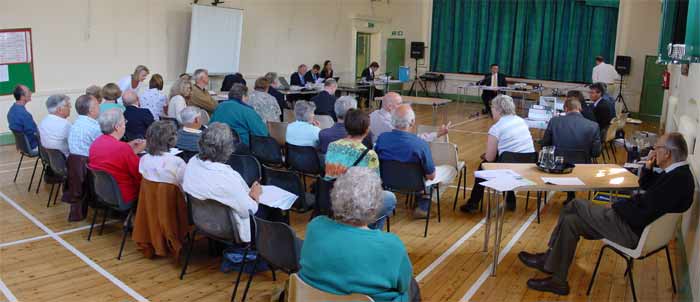 |
|||||||||||||||||||||
| The appeal hearing by Linden Homes (Western) Ltd and the Rector & Churchwardens of All Saints' against the planning refusal by North Somerset Council opened at 10am. | |||||||||||||||||||||
 |
 |
||||||||||||||||||||
| North Somerset Council were represented by David Fletcher, barrister, David Robbins, Principal Planning Policy Officer, Lee Bowering, Principal Planning Officer, Dr Nick Michael, ecologist, and David Barrett, drainage consultant | Linden Homes (Western) and the Rector & Church-wardens of All Saints' were represented by Richard Phillips, QC, with, from Barton Willmore, Simon Prescott, Simon Hugh Jones, and Roger Key, traffic consultant. | ||||||||||||||||||||
 |
|||||||||||||||||||||
 |
|||||||||||||||||||||
| The Wrington Residents Group were represented by John Rubidge, Andy Tandy, Tim Gillions, and their solicitor, Anthony Mason of Ashfords of Taunton. | |||||||||||||||||||||
| Echo Irving, Chair, and David Glynn, Planning Committee Chairman represented the parish council. The presiding inspector, Jonathan Roberts, invited everyone attending to fill in the attendance form so they could receive a copy of his eventual decision. He explained that he had visited the Brook House site the day before, and had explored the village. He said he saw the main issues to be (a) whether the application conformed to the prevailing planning regulations, (b) whether or not the development enhanced the village, (c) questions of highway safety, and (d) wildlife habitat. He asked the lawyers to make brief opening statements. Richard Phillips, for the appellants, saw the only issues as being the interpretation of Local Structure Plan policies. He maintained there was unqualified NSC officer support for the Linden planning application. All the Wrington Residents Group concerns had been considered by NSC, and none of them stood up. |
|||||||||||||||||||||
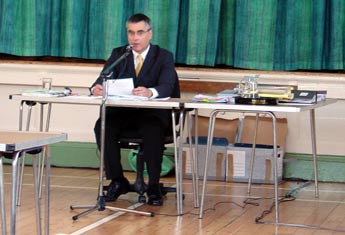 |
|||||||||||||||||||||
 |
|||||||||||||||||||||
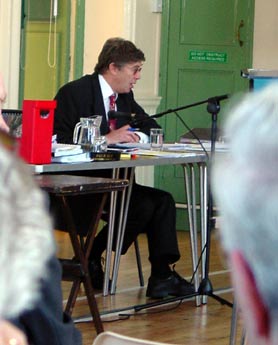 |
|||||||||||||||||||||
| David Fletcher for NSC insisted there were fundamental issues of policy on sustainability at stake, especially in relation to out-commuting. Wrington, he said, was already a dormitory settlement. | |||||||||||||||||||||
 |
|||||||||||||||||||||
| The Wrington Residents Group, according to Anthony Mason, believed NSC had not properly considered issues of (i) land not previously developed, (ii) conservation, (iii) wildlife, (iv) sustainability, and (v) residential amenity. |
|||||||||||||||||||||
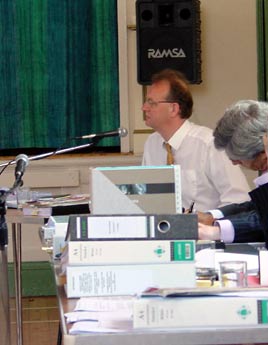 |
|||||||||||||||||||||
| Under examination by NSC counsel, David Robbins, Principal Planning Policy Officer identified the most important aspects of the current policy as (i) not meeting urban housing needs in rural areas, (ii) the type and scale of building, and (iii) that the primary kinds of permitted housing in rural areas were elderly residential, low-cost, and work+home builds. |
|||||||||||||||||||||
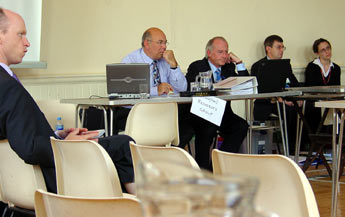 |
|||||||||||||||||||||
| The whole afternoon session was taken up by cross-examination of David Robbins by Richard Phillips, who, through persistent focus on the detailed wording of NSC policy documents, atempted to show that the Brook House development was not "a planned, substantial, expansion" which would have ruled it out; that it was important that people should be able to live where they wished; that there is effectively an embargo on any rural building not falling in one of the three categories of elderly residential, low-cost, or work+home units, which latter were a mirage since it was impossible, once they were built, to force people to work in them. In answer to his assertion that "if the Inspector does not agree with your position on the application of policy, you have no other grounds for rejecting the application ?" David Robbins replied "Correct." |
|||||||||||||||||||||
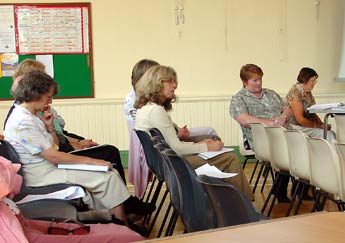 |
|||||||||||||||||||||
| When Richard Phillips raised the contentious issue of availability of employment, and what Lee Bowering had agreed should be included about this in the statement of common ground, NSC counsel asked for time to take instructions from his clients. Counsel found he could not agree a total of three important points in the statement, which, it appeared, had resulted, on the NSC side, from issues which had been "overlooked". It was agreed to halt proceedings at 5pm and reconvene at 9.30am. |
|||||||||||||||||||||